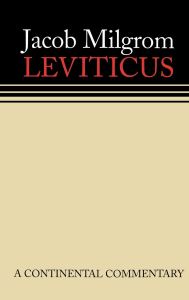Every single English translation I have seen, and I did check all of them on BibleHub, obscures a crucial aspect of Leviticus 1:1. The opening words in Hebrew read, וַיִּקְרָא אֶל־מֹשֶׁה “He called to Moses.”
If you check all the English translations that I checked on BibleHub, this clause is universally translated as, “The Lord called to Moses,” where the Lord refers to the divine name. Of course, some translations will say Yahweh or Jehovah, depending on their conventions for translating God’s name, but these are no better.
The issue is that God’s name is actually not there, and even the pronoun “He” is implicit in the verb. At this point, you might be thinking, “Kevin, are you suggesting that “He” is referring to someone other than God here? Why does it matter whether God’s name is used or “He” if both are referring to the same Person?”
Because by using a verb and only implying the pronoun “He,” we are invited to look to a previous verse. The reason why this seems odd, and the reason why all modern translations, I suppose, add in God’s name, is because this is the first verse of the book. So, why would Leviticus start this way? Leviticus 1:1 starts this way because it is connected to a previous verse.
Exodus 40:35 says, “Moses was not able to enter the tent of meeting, because the cloud settled on it, and the glory of Adonai filled the tabernacle.” In one of the final verses of Exodus, God’s glory fills the tabernacle. And it says that Moses was there, but he could not enter into the tabernacle itself because God’s glory was there.
Reading Leviticus 1:1 immediately after this verse makes perfect sense. God is in the tabernacle already. The text of Leviticus 1:1 then reads, “He called to Moses. Adonai spoke to Moses from the tent of meeting.” So after God’s presence fills the tabernacle, He starts talking to Moses, who, still being outside the tent itself, is unable to enter as Exodus 40:35 makes clear.
Spelling out the subject of the initial clause by including God’s name instead of simply using “He” severs the connection with the previous narrative.
Let me answer one brief objection to this. Part of what obscures this connection is the text of Exodus itself. Exodus 40:35 is not the last verse.

There are, in fact, three more verses that talk about what would happen when the cloud would travel around. And what Israel would do when that happened. Why are these verses there? In Jacob Milgram’s magisterial commentary on Leviticus, and it is indeed magisterial if you talk to any scholar of Leviticus, he says that Exodus 40:36-38 connects to Numbers 9:15-23, where the cloud actually starts to move. All of the intervening material is then included in this giant parentheses, as he calls it.
Now, Milgram suggests that Exodus 40:36-38 must be the addition of another editor or scribe because it does not flow with the narrative and grammatical connection between Exodus 40:35 and Leviticus 1:1. I don’t think the evidence demands this.
The switch to a habitual does indeed serve to point forward to the time when the cloud would actually move. As we find in Numbers 9:15-23, but this does not mean that a separate scribe added this in. If a single scribe wanted to bracket Leviticus and draw attention to it, as Milgram suggests, he could use the literary device of bracketing for the exact purpose that Milgram suggests it is used for by the second scribe to highlight its importance. There is nothing in the text that requires two scribes, and in fact, a single scribe with the whole of Exodus, Leviticus, and Numbers in view arguably makes more sense.
The little details of translation matter. The first verse in Hebrew makes it clear that Leviticus is a continuation of the story.
Unfortunately, many English translations obscure the narrative nature of the center of the Pentateuch. Many wrongly read Leviticus as a collection of unrelated laws rather than as part of a story about what happened when God dwelt with man for the first time since the Garden of Eden.
